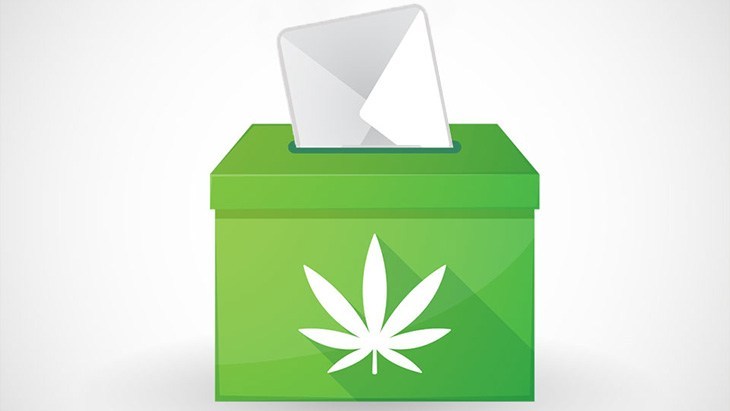
With the whirlwind of chaos that 2020 has been, a global pandemic in a tribally divided country with ever present social issues and prejudice that’s in a federal election year, many forget that states across the country are also holding their respective elections for positions in all branches of government. In fact, they’ll see that elections are happening across the nation on both the federal and state level that could have grave impacts on the status of many subjects, cannabis reform, criminal justice reform and reproductive rights among them.
In Nevada alone, District 3 Congresswoman Susie Lee is up for re-election, as are numerous state officials in both the Senate and Assembly, some serving for quite some time. Although cannabis is legal for all adults in Nevada, the fight for further reforms and protections for medical patients against a federal system that views them as criminals continues to rage on. Therefore, it’s important to understand the views of cannabis access and reforms from those who have an opportunity to represent Nevadans.
Susie Lee
The incumbent Congresswoman for District 3, Susie Lee says that it’s “past time” to end federal prohibition and giving back rights and justice to those affected by the War on Drugs. A sponsor of the SAFE Banking Act to divert legal cannabis operations from having to operate cash-only and plans on voting for the MORE Act, Lee is however against homegrowing. Yet, her frequently shared viewpoint of the Nevada cannabis industry is apparent.
“The legalization of recreational marijuana has been successful in several respects. It was broadly supported based on the premise that the tax revenues from marijuana sales would benefit education. Unfortunately, that did not happen initially, as funds were used for other purposes. After a legislative fix, marijuana sales have generated revenue for the state and overall I believe Nevada is leading the way in what safe and legal marijuana sales can look like in this country. Because of the barriers presented by the lack of access to federal banking and traditional bookkeeping, it is more difficult to regulate the industry. Nevada continues to refine our cannabis sales system, and corresponding regulatory regimen.”
Further, Lee supports consumption lounges yet also holds true to her views that driving intoxicated of any type is a poor decision.
“This under-representation of African Americans in ownership of licensed establishments is a direct result of the lack of access to banking in this industry. Because marijuana establishments operate solely on cash, the initial investment in the industry was by individuals who had access to those levels of cash. As a result of systemic racism in our country, African Americans have significantly smaller net worth, and thereby the access to those levels of cash that were required for the initial investment. The statement that “people of color are 4x more likely to be convicted of marijuana related crimes” shows the clear systemic racism that persists in drug laws in this country. That’s exactly why we need to, not only decriminalize marijuana, but we have to provide justice for the people whose lives have been impacted by this unfair system.”
Robert “Vegas Don” Strawder Jr.
A Libertarian running for Congressional District 1 under the tagline “Hip Hop Meets Politics”, Strawder Jr. is in the process of establishing the Black Caucus of the Libertarian Party with campaign manager Yvonne Rainey.
On the subjects of cannabis reforms and expanded access, Strawder stays true to the Libertarian views on cannabis, that being overwhelming support and a stern condemnation of the War on Drugs and all efforts to prohibit access to the plant. Strawder has previously mentioned his support for programs that support recidivism reduction, or those who return to prison multiple times for whatever reasons.
“I want to legalize marijuana federally and release all incarcerated individuals who are locked up with non violent marijuana charges.” Strawder stated clearly.
A supporter of thorough medical access, cannabis tax revenue actually being used for CCSD education, home growing and a opponent of cannabis-based discrimination in both employment and in regards to Child Protective Services, Strawder’s stances on legal protections for cannabis use in personal lives is apparent. Further, he supports consumption lounges and further research as well as widespread expungements and reforms in our criminal justice system.
Katie Duncan
President of the Las Vegas Ward 5 Chamber of Commerce and a resident of the district for four decades, Republican Katie Duncan is running for State Assembly District 6. Although running as a Republican, Duncan has far differing views on cannabis than others in her party. Duncan insists that “all federal prohibitions of marijuana” are removed and that cannabis should be covered by Medicaid and Medicare. Duncan believes that the retail side of cannabis should be less “policed” and admitting to wishing to work directly with NORML to stay up to date on reforms in the state. Widespread expungements are certainly a pillar of Duncan’s platform as are legal protections for patients.
Possibly due to her position as a member of the Board of Directors of Wongu University of Oriental Medicine, Duncan fervently supports home cultivation and consumption lounges. She wants more research to be done on DUI laws against cannabis users and the state creating incentives for those previously incarcerated or judicially punished because of cannabis consumption and use.
Eddie Facey
Another Republican, accountant and aviation businessman Eddie Facey is running for Assembly District 8 in Carson City. Like a growing number of his contemporaries in his party, Facey supports the ending of federal cannabis prohibition and medical patients receiving a higher quality product than recreational users.
He believes that AB 132 set in stone that cannabis employment discrimination is prohibited and it shouldn’t be legislated further and doesn’t plan on legislating any protections for housing discrimination for cannabis use or CPS involvement in the lives of users. Although he’s a supporter of consumption lounges and the recent mass expungements, Facey gave an interesting response in regards to home cultivation.
“I am not sure how this could be allowed and then have a licensing system for growers and dispensaries. There is already somewhat of a black market for these products that is avoiding taxation, and I would want to understand the effect on the legal industry before deciding on this issue.”
Although, he gave a great response when it comes to the lack of diversity in cannabis-related business owners.
“As for the low percentage of African-American owned establishments, I observed that the granting of licenses seemed to be a highly political process that may have disadvantaged those with less capital to hire the right consultants or less political connections. I am not necessarily proud of the way licenses were awarded, and would be open to try to ensure a more equitable licensing approval process for future applicants.”
Steve Yeager
The incumbent Assembly Representative for District 9, attorney and public defender Steve Yeager is well-versed in the world of Nevada politics and cannabis reform. Along with speaking at multiple Las Vegas NORML meetings, Yeager supports expanded medical access and the ending of federal prohibition. As for cannabis-related reforms and legislation he’s either lobbied for, authored or sponsored, it’s extensive.
“As a lobbyist, I supported Senator Segerblom’s dispensary legislation in 2013. I voted yes on the legalization ballot question in 2016. I sponsored AB135 in 2017 – that made changes to how cannabis works with DUIs; I sponsored AB164 in 2019 which made positive changes to cannabis advertising. I co-sponsored AB192 in 2019, which made it easier to seal a cannabis related conviction. I supported AB132 in 2019, which prohibits discrimination pre-employment for someone who tests positive for cannabis. I also sponsored ACR7 in 2019 – establishing a study of cannabis and DUI.”
He’s firmly against employment discrimination and is for social consumption lounges, yet it will “depend on the details.”
“This is something we need to get right from the outset.” says Yeager. On the subject of cannabis DUI reform, Yeager is quite knowledgeable in the topic, as he’s the Chairman of the committee that has been looking into those possible changes.
“I intend to bring legislation on this topic in the 2021 session.”
As for the lack of diversity in cannabis business ownership, Yeager admits that the overwhelming majority exists and that he knows “how our legalized industry came to be.”
“That being said, Yeager replied, “we certainly need to keep diversity and historically disadvantaged communities in mind as we look at future opportunities in the cannabis industry.”
Liz Becker
The Democratic candidate for District 18 currently held by incumbent Scott Hammond, the South Carolina native and environmental scientist fully supports many aspects of cannabis reform. From being a supporter of cannabis reform since she could first vote in 2000 and then as a ballot initiative, consumption lounges for tourists confused by its legal status yet lack of places to legally consume.
“I would love to speak with your group about other regulations that you feel are necessary.” Becker replied.
As many of her fellow candidates, she supports legal protections in housing, employment and parental rights for cannabis consumers.
Given her professional background, Becker has an interesting stance on the subject of Nevada’s cannabis DUI laws.
“Screening tests for marijuana are misleading because THC stays in the bloodstream many days and weeks after the intoxicating effects of the drug have worn off.” Becker informed. “Field sobriety tests and much more accurate blood or breath testing is needed. As a scientist myself, I am dedicated to making policy on this issue evidence-based and not skewed by politics.”
On the criminal justice side, Becker, who supports the MORE Act, absolutely stands behind expungements and has sharp criticism of our current system.
“We have much work to do to support Black-owned marijuana businesses in Nevada. The disparities in the arrest rates for people of color for possession of marijuana are embarrassing. We have all seen this phenomenon first hand in stop and frisk policies in minority neighborhoods as compared with how college campuses are policed. I am dedicated to being a voice for criminal justice reform in the legislature.”
Jason Frierson
Currently the incumbent Assemblyman for District 8, attorney Jason Frierson has a record of voting for cannabis reform to back him.
“In 2013 I co-sponsored legislation that would have treated medical marijuana like any other medication prescribed. We do not prosecute people for being on prescription drugs and we trust that individuals do not operate a vehicle when impaired, the legislation I cosponsored would have given those same rights to medical marijuana users. This legislation unfortunately did not pass the state legislature in 2013, but in 2017 under my leadership the Assembly passed legislation to modernize our DUI laws to follow our newly passed recreational marijuana use. In 2017 we ensured that individuals who are suspected of driving under the influence of marijuana are in fact tested for the type of THC that causes impairment. In 2019 we passed legislation to ensure that Nevada’s workers were not denied employment simply for using recreational marijuana. Also, I co-sponsored legislation to ensure persons convicted of an offense that has been decriminalized, such as cannabis, to have their record sealed and civil rights immediately restored.”
A firm supporter of medical access, he’s supported the plant since 2001’s medical legalization and supports expungements and parental rights given his experience in the Public Defender’s Office and seeing that most cannabis-using parents raised their children in a healthy environment.
As for the regulations of cannabis and how our recreational industry could be better, Frierson had a few comments.
“I supported the passing of the ballot measure and was Speaker of the Assembly when the legislature was tasked with implementing and regulating the new law. I also served as Chair of the Legislative Commission, when we passed the regulations with respect to the sale and use of recreational marijuana. Those regulations are not perfect, and I look forward to working with industry leaders and community members to continue making the regulations as perfect as we can that best reflect the will of voters and create the best structure to manage the sale and use of marijuana. As far as the overall social acceptance, recreational marijuana was passed by the majority of Nevada’s voters. I think it is safe to assume Nevadans accept cannabis use.”
Kamau Bakari
Running from the Independent American Party for Nevada Congressional District 1, Kamau Bakari holds similar views on cannabis as his fellow third party candidates. While leaning more conservative on his view on reproductive rights and the current occupant of the White House, he believes in no “mandates” or prohibitions on medical cannabis whatsoever, fully supporting the rights of the patient. Also, he seems to mostly support mass expungements, even suggesting that they act retroactively and go back to 1970.
Although on the subjects of employment and housing discrimination, consumption lounges and children safety/CPS involvement, Bakari’s answers were either vague or not entirely supportive.
Employment Discrimination: “Follow the Rule of Law and Common Law.”
Housing Discrimination: “Cannabis consumption could be taken with edibles. I am opposed to smoking it, especially where children may be exposed to secondhand smoke or those who don’t subscribe to cannabis have to smell it, it has an effect on people. It’s not like smelling your neighbor grilling a set of porterhouse steaks.”
CPS Involvement: “Should never be used around children under age 18 and really, 21.”
As for NORML’s question regarding people of color being four times more likely to be convicted of cannabis crimes and the lack of diversity of canna-business owners, his answer was unique. I’ll let it speak for itself.
“As a Black American, I have observed the myth of racism and concluded the ongoing discussion of racial bias is a divisive indoctrination hate speech that exists for troubled Americans of any race, but eludes the immigrant here of that same race, since naturalized immigrants work for America and America works for them. No matter what race or creed, takers can’t win in the long run and connecting ownership to this conviction rate is akin to connecting gas station owners to DUI, there is no correlation.”
Rochelle Nguyen
The Democrat incumbent Assemblywoman and attorney Rochelle Nguyen of District 10 is running for re-election on a platform of ending federal prohibition and expungements with eliminating entire criminal statutes. Previously, she worked on Assembly Bill 236 with the Assembly Committee on Judiciary. Among her many supportive comments for cannabis, Nguyen mentioned twice that she’d support public consumption establishments as long as the regulations and statutes are explicitly written as well as a general support behind home growing.
“I want to make sure that real discussions about equity are included in those conversations.” Nguyen replied.
And while not directly answered, Nguyen did mention that she “believes that we need to look at having the flexibility to allow for innovation and entrepreneurship within the industry”, possibly suggesting that she’d be open to further reforms on regulations and statutes that the Nevada cannabis industry must operate under.
Open to learning more about the subject of cannabis DUI’s and how to make the cannabis industry more inclusive and diverse in regards to business ownership. Nguyen ended her responses by saying that she’d be very welcoming of “new information and discussions about how we can work together in this area.”
Mack Miller
Running in the election for Assembly representative of District 5, Republican Mack Miller’s views on cannabis are well known from his responses.
While he initially answered that he’d support ending federal prohibition, Miller then replied that “My only support comes from the fact that the majority of the constituents appear to support it. I personally do not, however as a representative of the People, my job is to represent their interests, sometimes at the expense of my own positions.”
Miller does indicate that he would support physician-recommended cannabis, however wouldn’t comment on whether he believed the Nevada cannabis industry has been successful but simply replied “Yes” when asked if there were areas of improvement in the industry. An opponent of employment discrimination, Miller still believes that cannabis use in private residence that aren’t owned by the inhabitants is a subject that needs to be discussed.
And while Miller is against CPS involvement, he believes that cannabis shouldn’t be consumed around children. As for his response on whether he believes that cannabis consumption lounges should exist in Nevada, I’ll just post it below.
“Yes, bars exists don’t they? Keep in mind, consuming either cannabis or alcohol and getting behind the wheel of a car is illegal. Also if you want me to be frank, bars should not have parking stalls, laws should require an establishment that is only a bar to contract with a car service, Lift, uber, taxi, private sedan companies etc for their patrons.”
Miller did mention being open to speak with NORML yet Miller’s final response to the question about supporting expungements may be understood as disheartening towards cannabis reform advocates.
“Not necessarily. I get the idea that since it’s basically legal now, we should expunge prior convictions. I support expungement in the form that the person requesting it has to petition the court for it and pay the filing fee. I don’t want to burden the taxpayer with that court backlog of AUTO-EXPUNGEMENTS to matters that were in fact once a criminal act when committed.”
Jonathan Royce Esteban
Possibly the youngest candidate in the race, Esteban is running for Nevada’s 4th Congressional District on the often-held Libertarian philosophy of fiscally conservative and socially liberal. As such, the former Clark County School District employee and workplace coordinator at Tesla supports full federal legalization and promises to “promote a green rush of marijuana, hemp, and related products and venues.”
With unfettered access to medical cannabis and subjecting farmers to fair compliance laws that make product quality transparent, Esteban’s plan would address issues still prevalent in Nevada cannabis. Yet, the plan would also allow unlimited home cultivation, regardless of proximity to an existing dispensary.
For employment testing, Esteban believes it should be a policy decided privately by the employer and housing discrimination should be prohibited. Consumption lounges, DUI research and mass expungements are all parts of Esteban’s platform.
When asked about the fact that Americans of color are four times as likely to be convicted of cannabis charges and lack of diversity in legal canna-business ownership, Esteban gave an answer that would directly confront those existing issues.
“At its core, our criminal justice system is tilted against racial equality. My radical platform for criminal justice reform will right the wrong of marijuana criminalization and expand opportunity for black owned dispensaries by provided SBA loans for these startups.”
Steve P Brown
Running in Congressional District 3 as well is veteran and business owner Steve P. Brown. Brown, certainly with Libertarian leanings, wants “unlimited quantities of marijuana for all 50 states and territories. A supporter of legalization since 1974 yet not a consumer himself, Brown wants cannabis’ taxes to be lower but having a cultivation license should be as simple as receiving a license to sell tobacco. Also, Brown states that cannabis should be able to be grown as easily as someone grows corn.
Somewhere, Willie Nelson is smiling just hearing the phrase “grow weed like corn.” Firmly against employment and housing discrimination, CPS involvement, Brown is still a suporter of consumption lounges and refers to cannabis charges as obscene.











